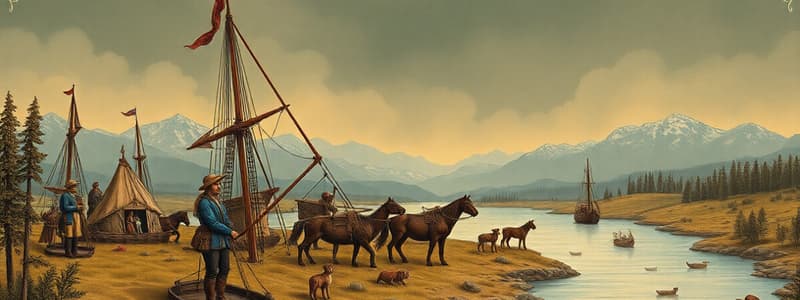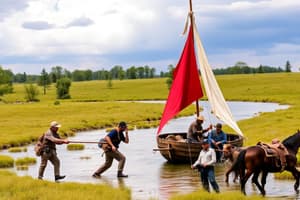Podcast
Questions and Answers
What was the main goal of the Lewis and Clark expedition?
What was the main goal of the Lewis and Clark expedition?
- To find a water route connecting the Columbia and Missouri Rivers (correct)
- To establish trade with Native Americans
- To find gold and other valuable resources
- To create a long-term settlement in the west
In which year did President Jefferson send Lewis and Clark on their expedition?
In which year did President Jefferson send Lewis and Clark on their expedition?
- 1805
- 1803
- 1804 (correct)
- 1801
Where did the expedition begin?
Where did the expedition begin?
- Fort Mandan
- Oregon
- St. Louis, Missouri (correct)
- Columbia River
How did Lewis and Clark spend the winter during their expedition?
How did Lewis and Clark spend the winter during their expedition?
What method did Clark use to document their discoveries?
What method did Clark use to document their discoveries?
What types of hardships did the expedition face?
What types of hardships did the expedition face?
What is one animal that was discovered by Lewis and Clark during their expedition?
What is one animal that was discovered by Lewis and Clark during their expedition?
Which Native American tribe did Lewis and Clark notably interact with?
Which Native American tribe did Lewis and Clark notably interact with?
What did Lewis and Clark do upon returning from their expedition?
What did Lewis and Clark do upon returning from their expedition?
What major geographic feature did the expedition find particularly challenging to pass?
What major geographic feature did the expedition find particularly challenging to pass?
Flashcards
Lewis and Clark Expedition
Lewis and Clark Expedition
A journey taken by Meriwether Lewis and William Clark to explore the western part of North America.
The Journey of Lewis and Clark
The Journey of Lewis and Clark
The expedition began near St. Louis, Missouri, and traveled to the Pacific coast, reaching what is now Oregon. They explored the Missouri River, traversed challenging mountains, and encountered various Native American tribes along the way.
Fort Mandan
Fort Mandan
A trading post where Lewis and Clark stayed for the winter of 1804-1805.
Chinook Tribe
Chinook Tribe
Signup and view all the flashcards
The Goal of the Expedition
The Goal of the Expedition
Signup and view all the flashcards
Hardships of the Expedition
Hardships of the Expedition
Signup and view all the flashcards
Clark's Contributions
Clark's Contributions
Signup and view all the flashcards
Discoveries of the Expedition
Discoveries of the Expedition
Signup and view all the flashcards
Journals and Records
Journals and Records
Signup and view all the flashcards
Significance of the Expedition
Significance of the Expedition
Signup and view all the flashcards
Study Notes
Lewis and Clark Expedition
- Mission: In 1804, President Thomas Jefferson commissioned Meriwether Lewis and William Clark to explore and map the western part of North America.
- Goal: Find a water route connecting the Columbia and Missouri Rivers.
- Team: A group of about thirty people.
- Starting Point: St. Louis, Missouri.
- End Point: Oregon Coast, then returned to St. Louis.
Expedition Details
- Journey: Canoe travels up the Missouri River, wintering at Fort Mandan.
- Navigation: Assisted by Native American tribes who provided knowledge of the rivers and terrain.
- Interactions: Traded with and befriended many tribes. Encountered hostile Blackfeet tribe; a battle occurred.
- 1805: Arrived on the West Coast, wintering there.
- 1806: Returned to St. Louis to report to President Jefferson.
Discoveries & Challenges
- Cartography: Clark created detailed maps of the rivers and landscapes.
- Natural History: Documented hundreds of new plant and animal species (e.g., grizzly bear, numerous bird and fish species, prairie dogs, harbor seals). Diaries kept records.
- Obstacles: Faced challenging terrain (Bitterroot Mountains).
- Environmental Hardships: Severe weather (thunderstorms, extreme temperatures, hailstorms, dust), lack of shelter, and disease-carrying insects (mosquitoes).
- Wildlife Threats: Encounters with various wild animals, including grizzly bears (which were a serious danger). At least 40 bear encounters recorded.
- Food Shortages: Almost faced starvation.
Studying That Suits You
Use AI to generate personalized quizzes and flashcards to suit your learning preferences.




